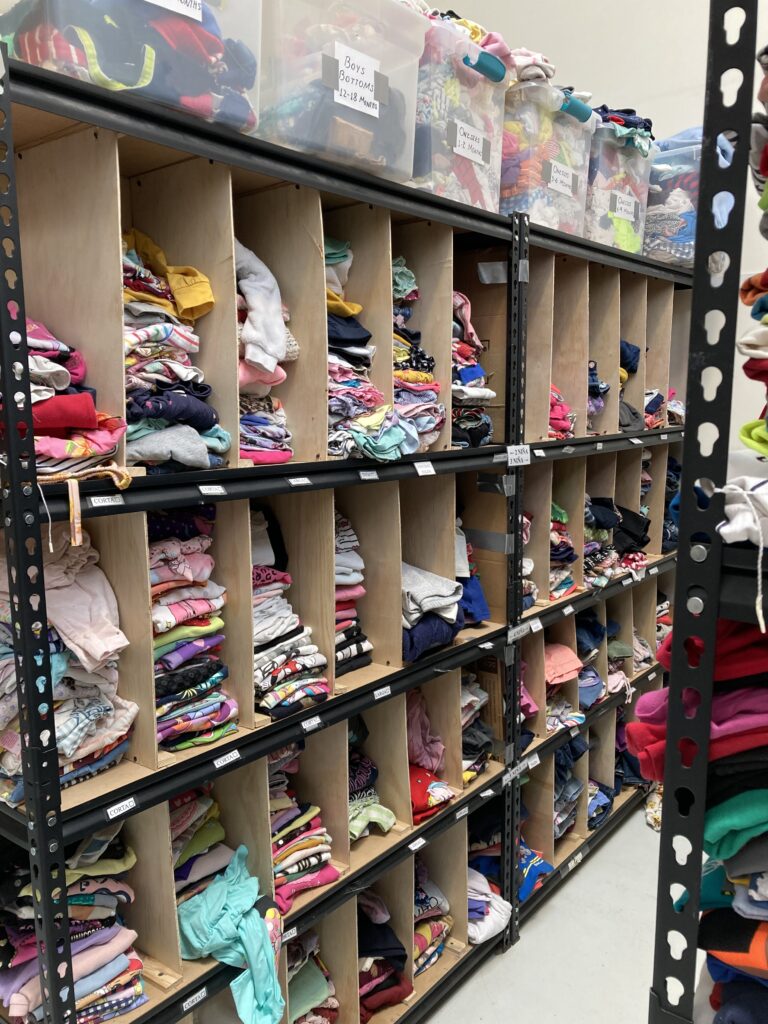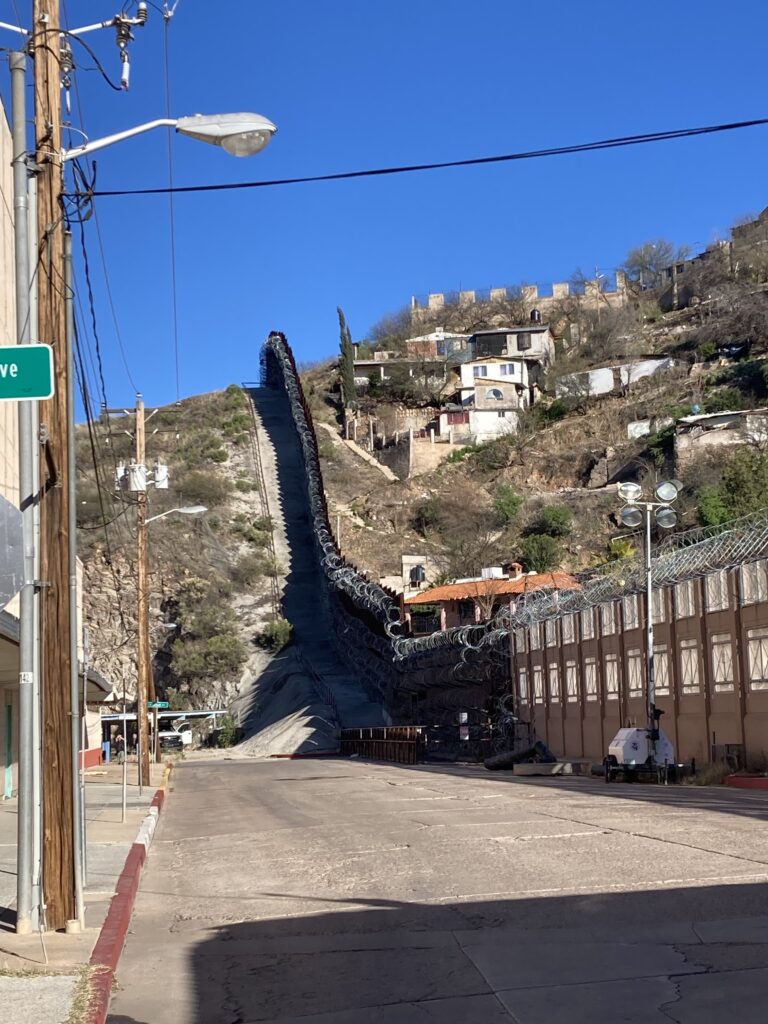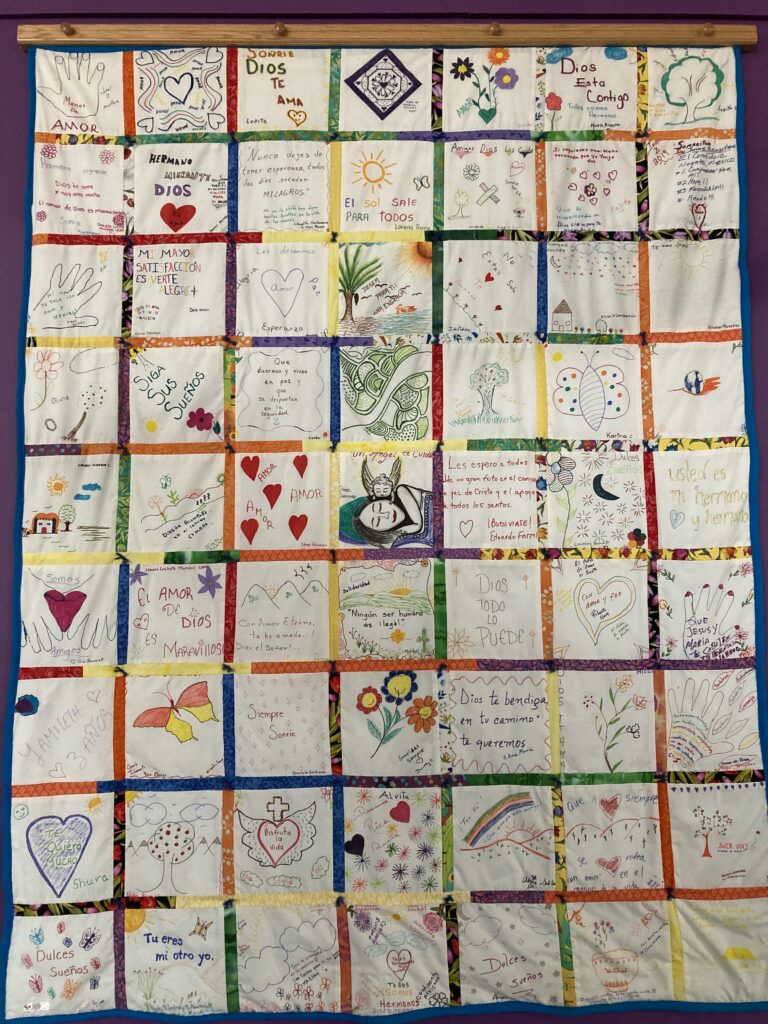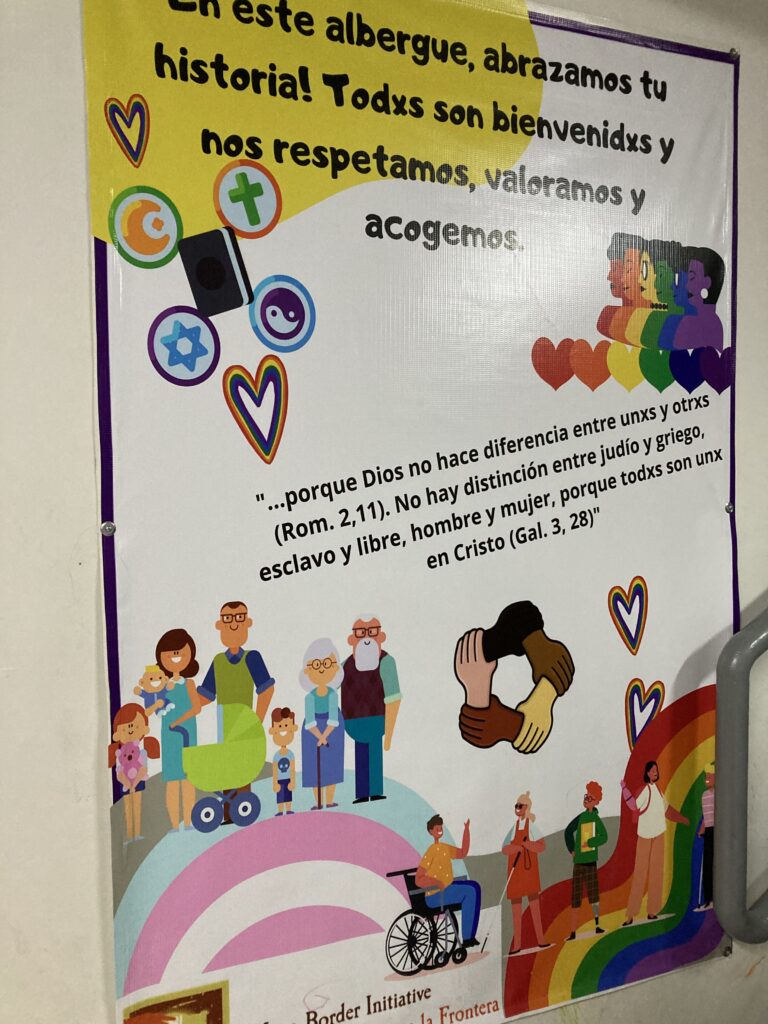March 4, 2023
“Let’s-go Ma-ri!!” sings Angel, the portero and person I report to, as I am walking back into the comedor to find more families that are on the clothing bank list. He is cheering me on because there is a lot of work to do and I have to go up and down the stairs many times. For the first time in my experience working with folks who don’t speak English (or are learning), I decide to offer up Mari as an easier alternative to my first name. Marie is my second name, although only my mom calls me that, sometimes.
The clothing bank, or “roperia” as it is called, is a job that I never had to have while working at Annunciation House. Because I was full time, I was quickly elevated to leadership roles, and while I did have to accompany guests into the clothing bank dozens of times, I never had to do it for very long, or for a whole shift, or as my only responsibility. I come to Kino, however, as a short-term support, wanting to learn their processes from the ground up, wanting not to inconvenience or ask for any special training or favors, and so they put me in the roperia.
Because of the building set up and distribution of resources, the volunteers take down requests and sizes far away from where the clothing and shoes are actually organized and stored. While some of the requests are easy and straightforward, others quickly become laborious with the challenges of cross-cultural sizes and the slim-pickings of the donations.

“You ever cry after working a shift in the roperia?” I text Audrey, my friend who annually comes to volunteer with Kino for a few weeks or months at a time. “Oh yeah…” she replies almost immediately. I am consoled and confused, because I always held my ability to be flexible, to do the jobs that no one else wants to do, to put aside my own interests to meet needs, in high esteem. And here I have this experience where I don’t enjoy my post, and I get back home at the end of the day exhausted and sin animo. There are some hard emotions in discovering that we are not exactly who we tell ourselves we are (or not meeting the expectations that we hold, however subconscious, for ourselves). And yet I have come to a place spiritually (thanks to countless mentors and the wisdom-sharing of others!!) where I try to observe these emotions and experiences in a non-judgemental way, and I try to discover the wisdom in them. I also recognize that it’s not really about the clothing bank (or the bread. I once cried – weeped, really – over discounted loaves of bread).
In my clothing bank support (and occasional covid testing), I meet lots of folks from different states in Mexico as well as Venezuela, Ecuador, Haiti. Most of them are on the journey northward, hoping to get an appointment to cross the border into the United States and request protection. Some of them have been deported from the United States, either after an attempt to cross or after some time living there (in one gentleman’s case, 28 years). I met three men who had been walking in the desert for five days when la migra arrested them. I helped with Creole interpretation for a Haitian woman who left home after “they” – the gangs who have taken over parts of the country – threatened to kill her for not paying extortion fees on her beauty salon business. Her sister is a U.S. citizen and has lived in Florida for 27 years, so there they will reunite and she will try to start again.

One of the other volunteers, Jerri, who is also assigned the kitchen-clothing bank rotation, asks me if I am getting what I expected/hoped for in coming to volunteer here. I love that question and I love that it is coming from her, who I just met a few days prior.
“I don’t think I had that many expectations coming here, except that I was excited to see the operation, and I wanted to be useful where I could be.” Jerri insists that I should be shadowing the coordinators, the director, all of the folks who are working behind the scenes. She is definitely onto something, but right now I am needed to hand out clean pairs of used socks and the warmest sweaters and coats we can find, and so I internally resolve to re-evaluate my approach for the future.
It is odd that my focus has dwelled on the specifics of my own tasks while visiting an organization that feels so significant in my life as a Catholic person seeking to live out the radical hospitality of the Gospel and church teaching, but the answers to our questions hardly ever come as beautifully romantic, clear, profound epiphanies. 🙂 Sometimes, even when we set ourselves up for the best possible outcome, we experience disappointment. That is okay!

I went for a hike this morning with Tracey, one of the Sisters of Providence that has welcomed me into Casa Teodora in Rio Rico. She is young and we are talking about dreams. “My very first spiritual director told me that if I want to learn more about my desires, that I start journaling the dreams that I have each night.” Tracey explained that this was strange advice, considering she understood at the time that she never had dreams. With the advice of the spiritual director, she set the intention each night that she have a dream, and that she remember it. For two weeks after the conversation, she had dreams every night, which, she shared, were extremely helpful in discerning her deeper desires.

We started talking about dreams because I shared that I had two bad dreams two nights in a row that woke me from my sleep. And when I was younger, I very often had bad dreams, and could only remember the bad ones. “My spiritual director taught me that dreams are not meant to shame or harm us. They are there for our healing and wholeness.” I wonder how to incorporate my “bad” dreams into the spiritual reflections that I try to have with all of my other not-so-enjoyable emotional experiences. As an Ignatian spirituality practitioner once told me, everything belongs.
I recently read “The Whole Language: The Power of Extravagant Tenderness” by Fr. Greg Boyle, whose writing always delights me. The book is, largely, about healing. And healing, I think, is the pathway to connecting us to our deepest desires.
“At Homeboy, we don’t want healing to be deferred. Now is the time. Here is the place. These are the people you can walk with. It is precisely this culture of kindness that stimulates the body and soul to heal itself. Since we are all walking wounded together, it is only tenderness that is mutually transformational. It can lead us all to awakened hearts.” (p. 175)
At Kino, there is energy and money and time spent on this effort. There are weekly, two hour psychology workshops for the adults that provide people with tools to manage some of the symptoms they may be facing as a result of the instability and trauma that is occurring in their lives. They have access to a psychotherapist, a social worker, workshops, and job-search assistance. Ushering people towards their dignity, which has, in most cases, been repeatedly abused or neglected, is a powerful and radical act. Even though all of these people are in transit, many hoping to enter the United States to seek asylum, Kino recognizes that “now is the time.”

“…because God does not distinguish between one another. (Romans 2:11) There is no distinction between jew and greek, slave and free, man and woman, because all are one in Christ (Galatians 3:28)”
